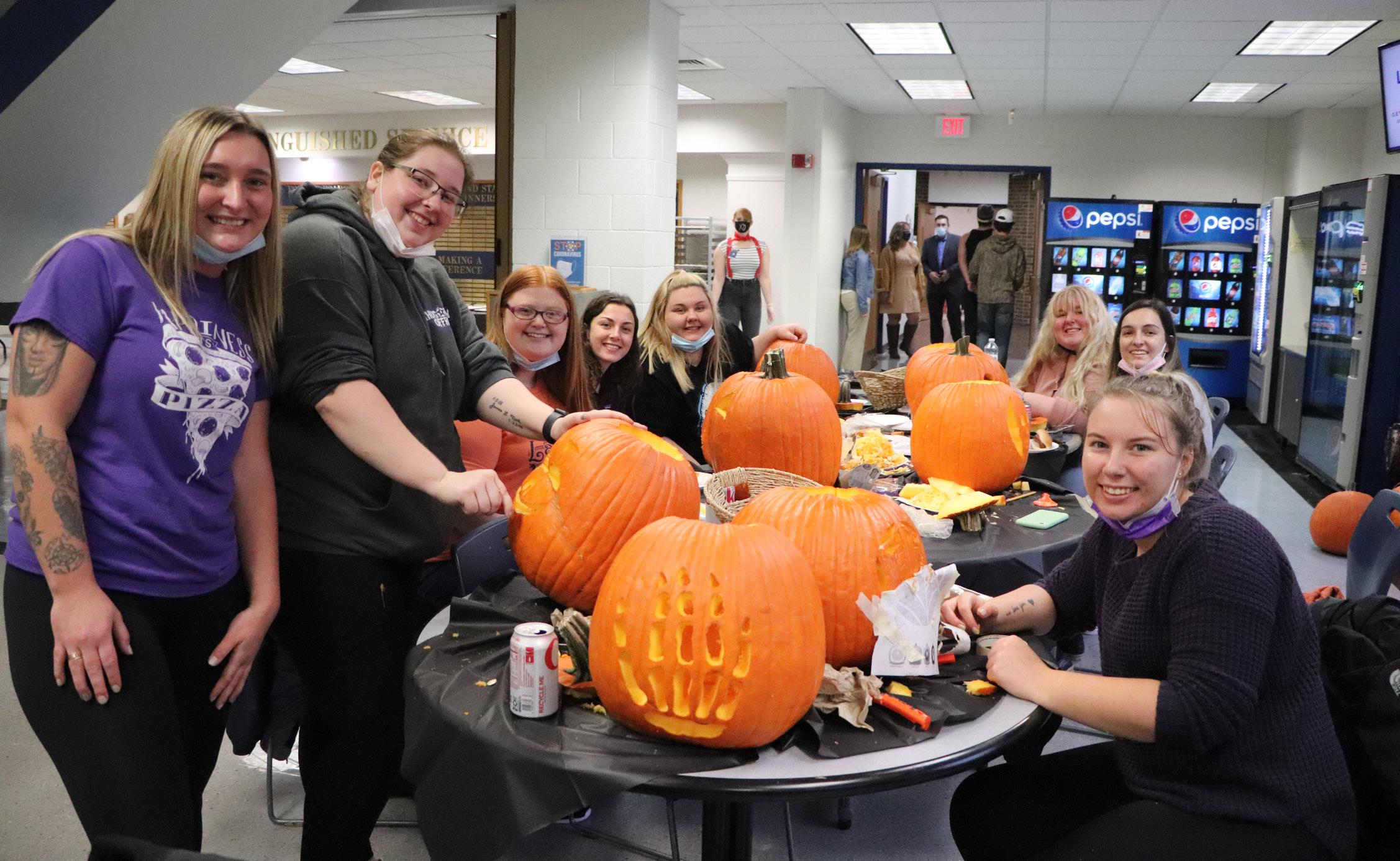
13 minute read
Community Outreach
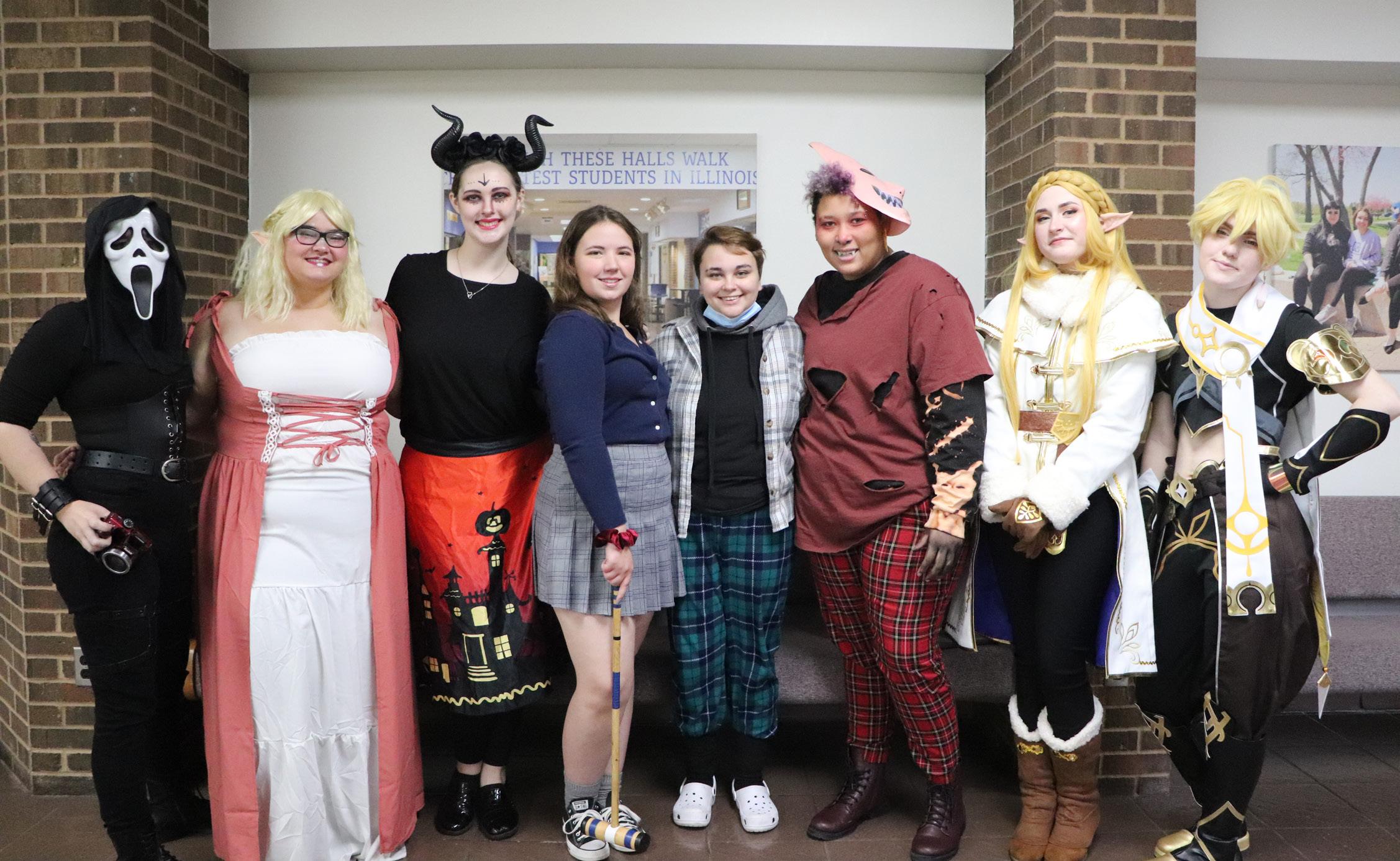
OTHER PROGRAMS & COMMUNITY OUTREACH
TRANSFER STUDENTS WHO PLAN TO PURSUE A BACCALAUREATE PROGRAM
Students pursuing an Associate of Arts or Associate of Science transfer program of study or selected Associate of Applied Science program, who know which college or university they plan to transfer to, and know what they intend to declare as a major should consult with a professional advisor or the approved program coordinator for transfer planning.
Professional advisors may be able to review the specific university transfer major curriculum and assist the student with identifying Kaskaskia College courses which will fulfill general education, major and/or elective course requirements.
For more information on the advisement process, please call Academic Advising at (618) 545-3060.
WORKFORCE DEVELOPMENT AND COMMUNITY EDUCATION
Workforce Development The Workforce Development department was established to coordinate the educational needs of businesses and industries throughout the College district. The B&I Division at Kaskaskia College understands that a trained workforce is the key to keeping the region as economically sound as possible. This department works very hard to develop customized training programs that are not ordinarily addressed through the traditional curricula of the College.
In addition, Kaskaskia College works very closely with the South Central Illinois Growth Alliance, an economic development organization, to develop and coordinate any and all training needs with businesses that may want to expand or locate in South Central Illinois.
Training can be offered at plant locations, in one of our many Educational Centers or on campus, whichever the company prefers. Training time is flexible to best fit the needs of employees and save businesses money. Both credit and non-credit classes are offered, depending on the focus and long range goals of a particular program for each business or industry.
Examples of the types of training programs offered are computer training of all types (i.e. Word, Excel, Power Point, AutoCad, etc.) Industrial and Construction OSHA, Forklift training, Scissor Lift, Platform Lift Training, Leadership and Management, Customer Service, Work Ethics and a series of other Workplace Leadership Subjects.
For further information concerning services and training provided by the Business and Industry Division call (618) 545-3400.
Continuing/Community Education
Kaskaskia College is proud to serve the lifelong learning needs of our district. Continuing and Community Education is all about providing classes, workshops and other learning opportunities to enrich lives.
Continuing and Community Education is for active, curious, and continually learning adults, adolescents and children. Great opportunities are provided for people to get together and participate in programs designed to be socially rewarding, stimulating and thought provoking. A variety of non-credit and credit classes are offered throughout the year. There are no exams, homework assignments or grades, just the opportunity to learn for learning’s sake. Programs are coordinated to reflect the needs and the interests of the community college population. These programs are changing, as needs and interest are also changing, but include academic enrichment, health and fitness, computers, dance, history, crafts, hobbies, personal enrichment and professional development. It is the goal of the department to assist students in obtaining courses to update personal skills, and reach educational and cultural goals.
KICK - The Kids In College at Kaskaskia program is designed for children from pre-Kindergarten through 8th grade and offers a variety of creative, learning-based programs, taught by fun and enthusiastic certified instructors. The KICK program’s broad range of classes allows participants to enjoy a summer of learning. With programs in math, science, art, reading, photography, computer and sports, children can pick their destination. The KICK program is offered through the Main Campus as well as the education centers and various locations throughout the District. The program begins in June and runs through August.
EDUCATION CENTERS
Kaskaskia College extends itself throughout District 501 to provide educational opportunities for all the residents of our district. The addition of Greenville, Nashville, Salem, Trenton, and Vandalia Education Centers makes it possible for those unable to attend classes on main campus to continue their education at a location closer to home. Programs and courses are offered whenever feasible and consistent with efficient use of available resources at the centers or other locations upon request. Information is available by calling the Regional Director of Education Centers (618) 545-3475.
CAREER SERVICES
Kaskaskia College offers comprehensive career services to students and area residents in the following areas:
Career Exploration, Career Decision-making, Career search, Career Fairs, Resume writing assistance, Interview preparations and job seeking. Career services are available on the main campus of the College and by appointment at the education centers. Resources are available on the College Website at www. kaskaskia.edu/campus-life/services--resources/career-services/.
The Adult Education and Literacy Department provides assistance to individuals who need to improve their academic, English speaking, employment, and life skills. The Adult Education and Literacy program provides the following grant funded programs: High School Equivalency Classes, The Reading Link, and adult volunteer literacy tutoring. The Adult Education program provides instructors and volunteer tutors to help learners to achieve academic and personal goals. The program also provides free classes for adults who need a high school equivalency credential. Individuals who are interested in the Kaskaskia College Adult Education and Literacy program should contact the department at (618) 545-3115.
DR. DEE AND SUE BOSWELL ART GALLERY
The Dee and Sue Boswell Art Gallery is located in the Lifelong Learning Center on the main campus. Exhibits showcase the creativity of students, faculty, alumni and regional artists. With the purpose of educating, inspiring, and promoting understanding through art, cultural artifacts and interpretive information. The gallery is open Monday through Thursday, for special events and by appointment. For more information about the exhibits, hours or to plan your visit call (618) 545-3025.
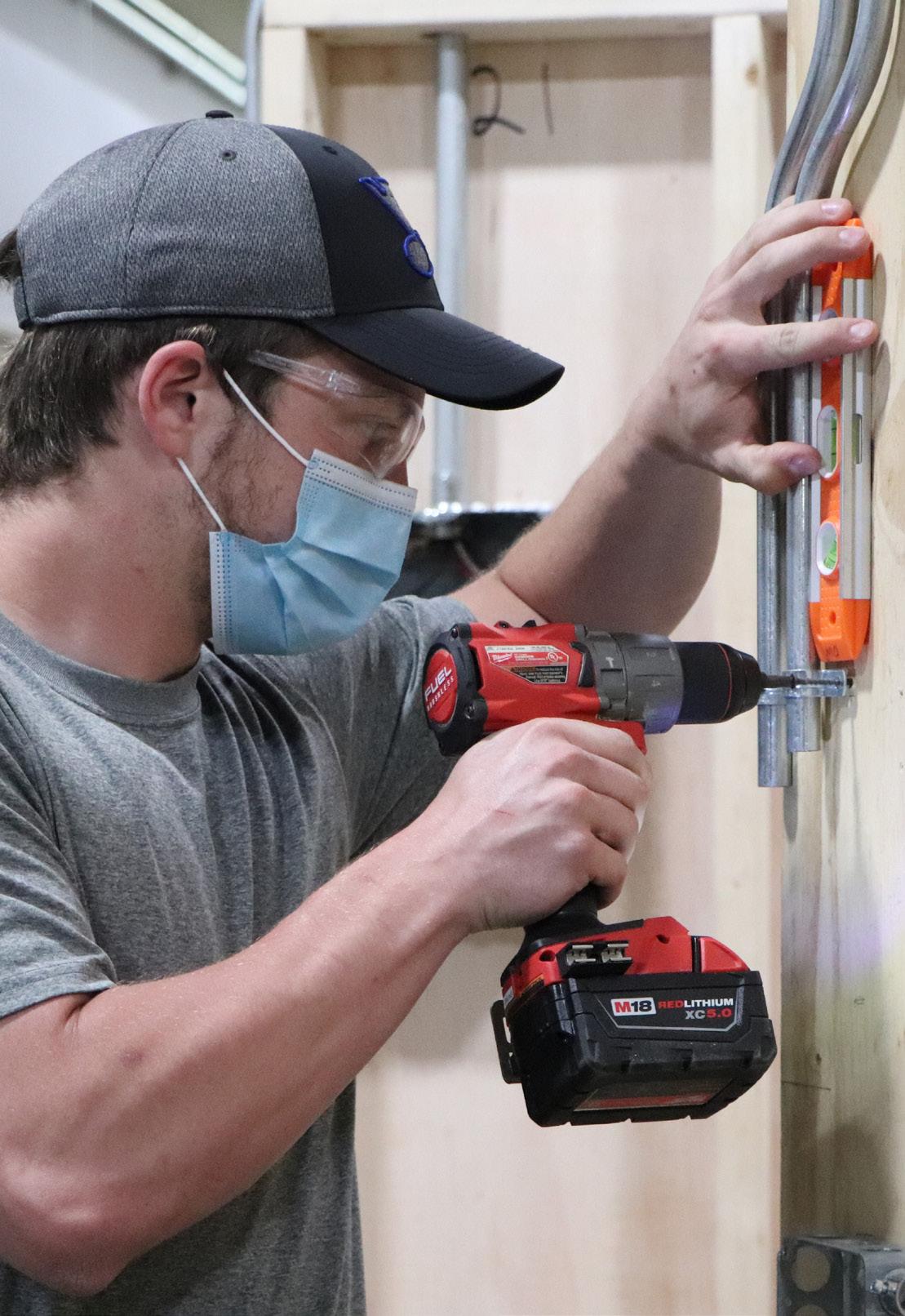
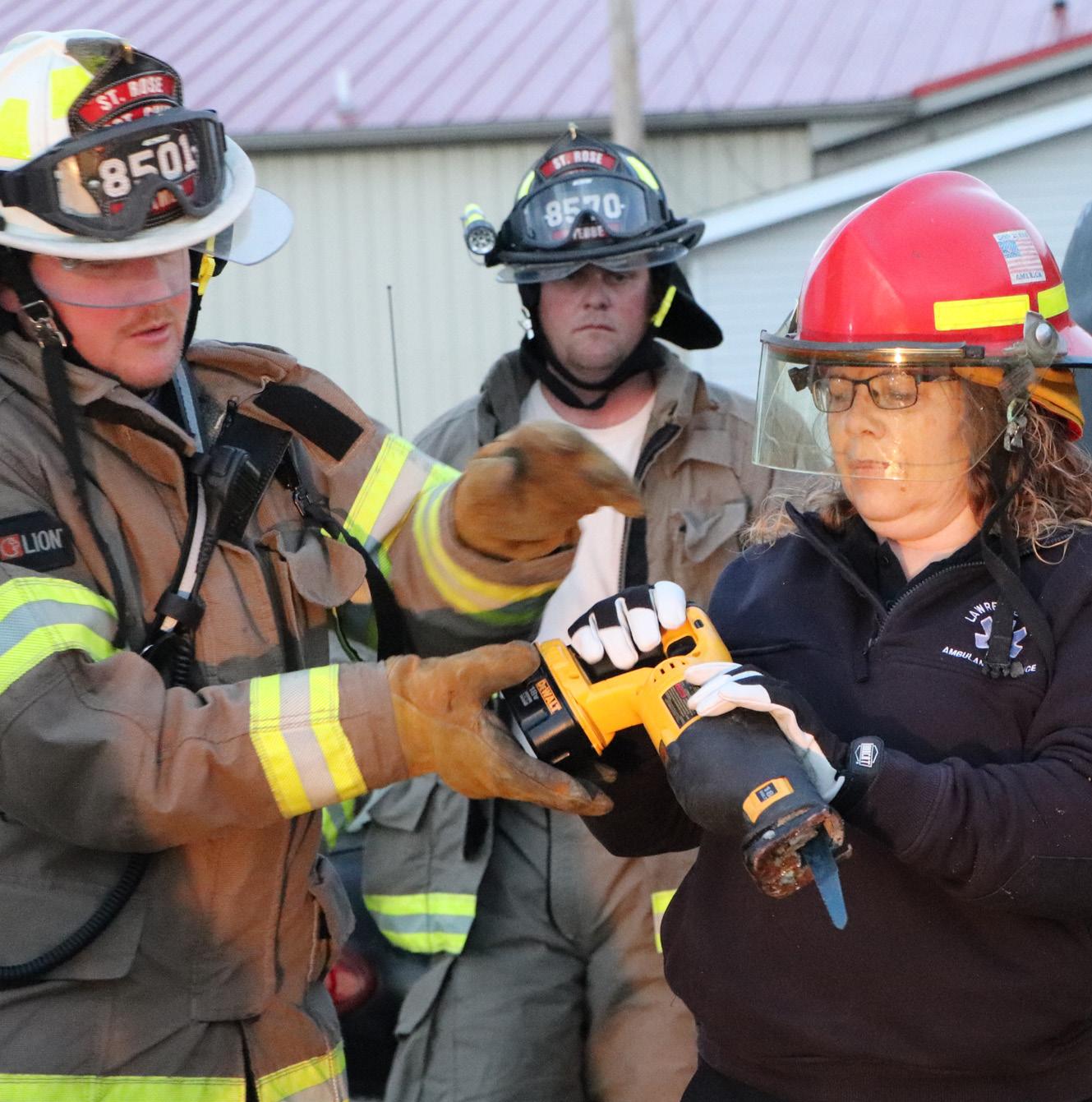
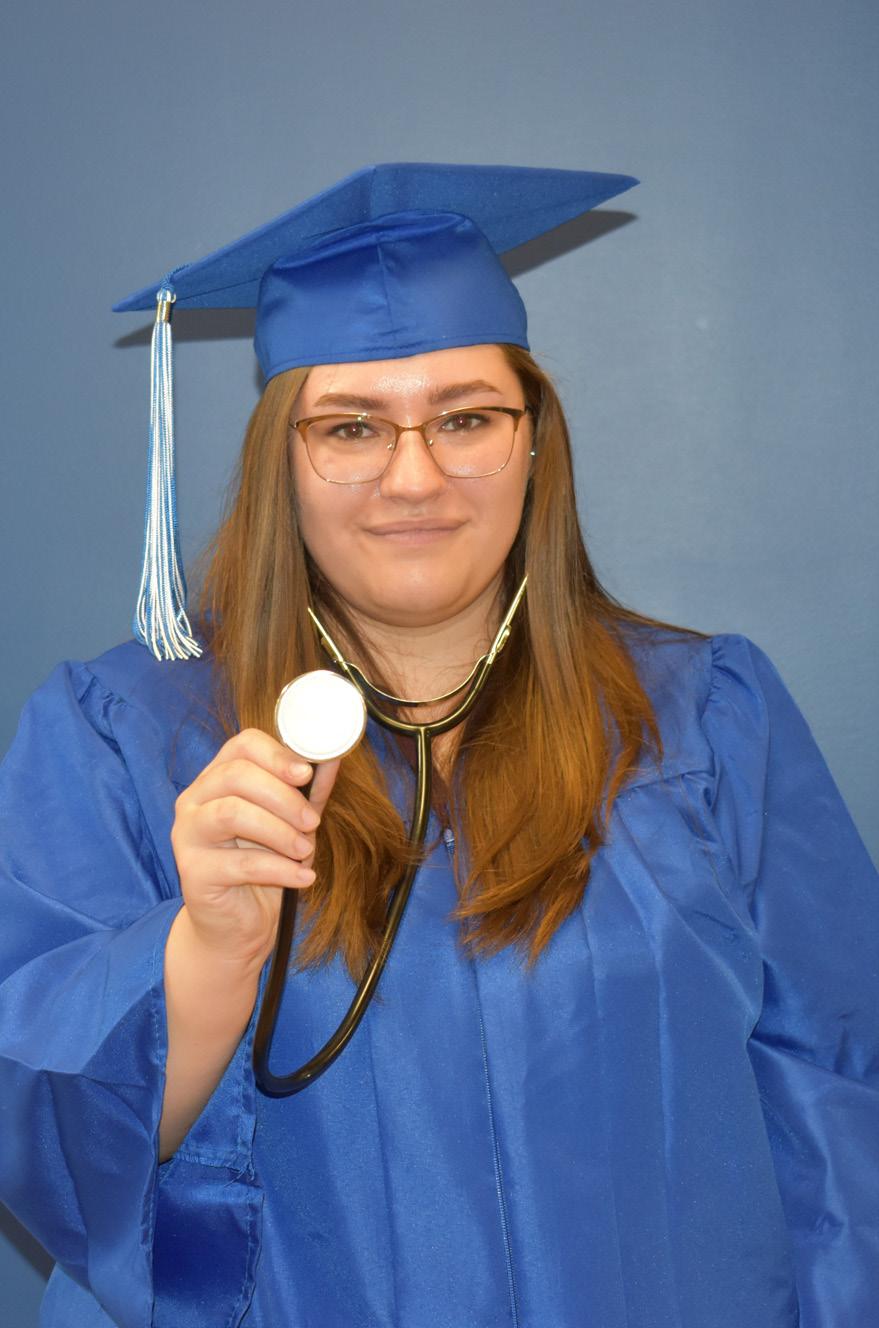
PROGRAMS OFFERED AT THE CENTRALIA CORRECTIONAL CENTER
CAREER TECHNOLOGIES
CRTH 101 Career Technologies 4
COMMERCIAL COOKING
AAS Certificates COOK.0505.CERT - Culinary Arts I COOK.0510.CERT - Culinary Arts II COOK.0508.CERT - Culinary Arts III
FIRST TERM
COOK 103 Intro to Culinary Professionals.............................4 COOK 104 Sanitation and Safety ............................................3 TECM 118 Vocational-Technical Math...................................3 COOK 125 Culinary Fundamentals.........................................4 14
COOK.0505.CERT - Culinary Arts I
Minimum required credit hours for certificate: 14
SECOND TERM
COOK 120 Baking I ................................................................3 COOK 11 Baking II...............................................................4 COOK 115 Meats, Poultry and Fish Preparation....................4 COOK 116 Food Presentation .................................................2 COOK 211 Specialty Foods ....................................................3 16
COOK.0510.CERT - Culinary Arts II
Minimum required credit hours for certificate: 30
THIRD TERM
COOK 126 Intro to Culinary Confections ...............................4 COOK 212 Cost and Portion Management .............................2 COOK 215 Food Serv Organization & Management..............3 9
FOURTH TERM
COOK 200 Commercial Cooking Field Experience
COOK.0508.CERT - Culinary Arts III
Minimum required credit hours for certificate: 43
COMMERCIAL CUSTODIAL SERVICES
AAS Certificate CMCS.0552.CERT - Commercial Custodial Services
FIRST TERM - 9 WEEKS
CMCS 101 Introduction to Custodial Services .......................3 CMCS 102 General Cleaning Practices ..................................3 TECM 118 Vocational-Technical Math...................................3 9
SECOND TERM - 8 WEEKS
CMCS 103 Hard Floor Care....................................................4 CMCS 104 Carpet and Upholstery Care.................................4 8
Minimum required credit hours for certificate: 17
CONSTRUCTION OCCUPATIONS
AAS Certificates CNTR.500.CERT Basic Construction Occupations CNTR.501.CERT Construction Occupations
FIRST TERM
CNTR 111 Intro. to Construction Occupations ......................4 CNTR 112 Basic Carpentry I..................................................4 CNTR 121 Blueprint Reading.................................................4 TECM 118 Vocational-Technical Math...................................3 15
CNTR.500.CERT Basic Construction Occupations
Minimum required credit hours for certificate: 15
SECOND TERM
CNTR 122 Basic Plumbing ....................................................4 CNTR 123 Residential Wiring................................................4 CNTR 131 Basic Masonry and Concrete Finishing................2 CNTR 132 Basic Carpentry II ................................................5 CNTR 133 Sustainable Residential Construction...................2 17
CNTR.501.CERT Construction Occupations Minimum required credit hours for certificate: 32
WAREHOUSE & DISTRIBUTION
AAS Certificate WHDB.0500.CERT - Warehouse & Distribution
FIRST TERM
WHDB 100 Working in Warehousing Environments...............2 WHDB 101 Warehousing Workforce Skills .............................2 WHDB 102 Warehousing Operations ......................................3 WHDB 103 Warehouse Technology and Analytics..................2 WHDB 110 Forklift Operations...............................................1 10
Minimum required credit hours for certificate: 10
CMCS-101 Introduction to Custodial Services 3-0-3
This course covers machine and electrical safety, the detergency process and chemical use, handling and mixing. Guidelines for working with blood borne pathogens and complying with OSHA and EPA regulations are stressed. Basic employability and career opportunities in the field are also covered.
CMCS-102 General Cleaning Practices 1-4-3
This course discusses the people, policies, and procedures involved in the cleaning industry. Selection of the proper equipment for each task, waste disposal, surface cleaning, vacuuming in a variety of commercial and public settings are emphasized along with safe procedures for dealing with blood borne pathogens and infectious wastes.
CMCS-103 Hard Floor Care 1-6-4
This course covers the identification of various types of flooring and the routine and restorative procedures to be used with each type. Experiences are provided with various methods of floor care including: dust “mopping, buffing/burnishing,” “machinescrubbing, stripping and applying” “finishes. The proper use, care and” maintenance of floor care equipment is emphasized throughout the course.
CMCS-104 Carpet and Upholstery Care 1-6-4
This course covers material and fiber identification for various types of carpets and upholstery fabrics along with the routine and restorative procedures to be used with type. Students gain experience with various methods of carpet and upholstery care including shampooing, extraction, bonnet cleaning, dry powder cleaning, spot/stain cleaning, and wet and dry foam cleaning. Proper use, care and maintenance of carpet and upholstery equipment are also emphasized.
CNTR-111 Intro. to Construction Occupations 4-0-4
Course covers basic safety principles fundamental to construction, including the correct use of power tools, emergency and First Aid procedures and avoiding hazardous conditions. Essential employability skills are introduced and reinforced throughout the remainder of the program.
CNTR-112 Basic Carpentry I 1-6-4
This course prepares students to be able to perform basic rough carpentry techniques from preparing the foundation through constructing the ridge board.
CNTR-121 Blueprint Reading 2-4-4
This course teaches students to read and interpret construction symbols, blueprints and interpret appropriate building codes. Students will learn how to sketch and dimension rough drawings.
CNTR-122 Basic Plumbing 1-6-4
This course prepares the student to design, install, test, and maintain supply and waste lines and various plumbing components.
CNTR-123 Residential Wiring 1-6-4
This course prepares the student to design, install, test, and maintain basic electrical systems.
CNTR-131 Basic Masonry and Concrete Finishing 1-2-2
This course prepares students to identify masonry tools, materials and procedures, operate power equipment, and estimate materials used in masonry.
CNTR-132 Basic Carpentry II 1-8-5
This course is a continuation of Carpentry I and builds on the skills the student has obtained in Carpentry I. The student will obtain the finishing skills required for the trade.
CNTR-133 Sustainable Residential Construction 2-0-2
This course is a basic introduction to environmentally sustainable practices in residential construction industry, including energy generation / conservation and water conservation. Students will be introduced to industry standards / guidelines and review sustainable materials and design techniques.
COOK-103 Intro to Culinary Professionals 4-0-4
This course covers the basic work attitudes characteristics and skills needed to work in the food service industry. Food service terminology, equipment identification, and usage information about types of foods and trends in the food service industry, and the development of interpersonal and communication skills are stressed, work behaviors and concepts covered here will be reviewed and reinforced throughout the rest of the program.
COOK-104 Sanitation and Safety 2-2-3
This course prepares students to take and pass the ServSafe Exam. The development of safe and sanitary working habits needed by each food service worker is stressed.
COOK-113 Baking II 1-6-4
This course covers the fundamental principles of baking and leavening agents. The production of baked items such as quick breads, pies, cakes, and cookies are also covered. Prerequisite: COOK 103 and COOK 104.
COOK-115 Meats, Poultry and Fish Preparation 2-4-4
This course teaches the student to identify wholesale and food service cuts of beef, pork, veal, and lamb, as well as, principles of preparing meats, fish and poultry.
COOK-116 Food Presentation 1-2-2
This course covers principles of the presentation of food from plating and garnishing through waiting on customers. Various serving styles are covered.
COOK-120 Baking I 1-4-3
This course covers fundamental principles of baking. Students learn to prepare biscuits, muffins, quick breads, and a variety of types of pies.
COOK-125 Culinary Fundamentals 1-6-4
This class will lay the ground work for strong culinary skills and professionalism that will be used in future classes and work experience. The class will cover knife safety and knife skills. Basic culinary skills such as the preparation of vegetables, fruits, salads, pasta and rice will be covered. Also basic stocks, soups and sauces will be covered. Students will also learn basic skills of
breakfast cookery and the different ways to prepare an egg. The class will utilize skills to cost recipes and convert quantities to recipes. Prerequisite: COOK 104, minimum grade C
COOK-126 Intro to Culinary Confections 1-6-4
This course will introduce the principals involved in tempering chocolate and preparing chocolates and other confections with soft, hard and liquid centers. Efficient methods to increase productivity in this highly specialized field will be highlighted. Prerequisite: COOK 211, minimum grade C.
COOK-200 Commercial Cooking Field Experience 0-20-4
The student gains practical experience in the area of food service operation. Activities include using commercial equipment such as dishwashers, deep fryers, ovens, and food processors. Students assist in preparation of meals in a large institutional kitchen. Prerequisite: COOK 103, COOK 104, TECM 118, COOK 125, COOK 120, COOK 113, COOK 115, COOK 116, COOK 211, COOK 126, COOK 212 & COOK 215
COOK-211 Specialty Foods 2-2-3
Advanced instruction on specialty food preparation. Prepare specialties such as ethnic foods, foreign dishes and food for special needs diets.
COOK-212 Cost and Portion Management 1-2-2
This course helps the student understand how to merchandise the food with a limited budget for profit. They learn to convert recipes, price recipes and how to calculate losses. This course must be taken concurrently with COOK 215.
COOK-215 Food Serv Organization & Management 3-0-3
This course is designed to help prepare the student for a career in food service management. The challenging field of management requires the students to learn flexibility and how to deal with the problems often encountered in the food service field. The student is required to write and produce a menu.
CRTH-101 Career Technologies 1-6-4
This course provides the basics for the individual to seek, gain, and keep employment, emphasizing the areas of document development, applications, personal development, and consumer skills to effectively transition students to society. In order to equip students with necessary skills to function effectively in the current workforce, a strong focus of this course will be on technological advancements and computer concepts. This course provides information, resources, and knowledge while also focusing on career exploration and career readiness; such as cover letters, resume writing, and interviewing techniques. This course will also explore personal, work, and financial issues that may arise in everyday life.
TECM-118 Vocational Technical Math 3-0-3
This course covers the use of the following math skills in solving occupational problems: whole numbers, fractions, and decimals; percents; measurement; formulas and equations; lines, angles and shapes; positive and negative numbers; and ratios and proportions.
WHDB-100 Working in Warehousing Environment 2-0-2
This course introduces warehousing fundamentals and the role warehousing plays in the supply chain. Topics include warehouse functions, structural composition, workplace safety and efficiency standards.
WHDB-101 Warehousing Workforce Skills 2-0-2
This course provides training in workplace practices that contribute to success on the job. Topics include effective communication, professionalism, and interview skills.
WHDB-102 Warehousing Operations 2-2-3
This course applies material handling tools and logistic principles to the receiving and distribution processes in supply chain facilities. It focuses on receiving, inventory management, order picking, and shipping preparation.
WHDB-103 Warehouse Technology and Analytics 2-0-2
This course focuses on key performance indicators for employees and facilities within both conventional and highly automated warehousing centers. Students will learn how to evaluate and utilize collection data devices, software, and equipment.
WHDB-110 Forklift Operations .5-1-1
This course prepares the student with the knowledge and skills to operate power industrial trucks in a warehouse environment. Students will illustrate forklift inspection procedures, safe loading and unloading procedures, and other driving activities.










